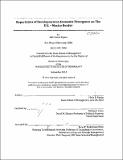Repertoires of development in economic divergence on the U.S. - Mexico border
Author(s)
Pipkin, Seth Daniel
DownloadFull printable version (14.08Mb)
Other Contributors
Sloan School of Management.
Advisor
Michael J. Piore.
Terms of use
Metadata
Show full item recordAbstract
This dissertation represents a new approach to the age-old social science problem of the underlying causes of economic development. It focuses on two initially very similar cross-border pairs of cities (McAllen, TX - Reynosa, Tamaulipas and Brownsville, TX - Matamoros, Tamaulipas) along the U.S. - Mexico border. The comparison of these two cross-border city pairs reveals that differences in patterns of local behavior led one small city on the US side, McAllen, to successfully exploit the opportunities offered by NAFTA after 1994. A review of relevant economic and demographic data as well as one year of in depth field investigation show that the differences in local outcomes cannot be explained by established causes. Their pre-NAFTA endowments were essentially the same, and McAllen and Brownsville pursued very similar economic development policies. Rather, I trace the economic divergence to the means by which local elites introduced and contested their projects. These differences and similarities enable us to speak of a community's "repertoire," a term borrowed from Tilly (1977, 1993, 2006) and Swidler (1986) to characterize a group's means pursuing and contesting goals with each other. Insofar as they pertain to patterns of communications and trust, repertoires relate to the network literature; however, in the cases observed here, the repertoires seem to predate the key networks of interaction, and, in a sense, to produce rather than to reflect them, suggesting that they are the underlying causal mechanism upon which we need to focus. While very similar for much of their early history, the two US-side cities' repertoires diverged around the 1930s. This took place when a region-wide shift in demographics and industrial base overturned the political boss structure that was common throughout South Texas. Insurgents in McAllen were left to their own devices and defeated their local boss after twenty years of struggle, in the process instituting a new local repertoire based on the "progressive," technocratic, pro-business politics they had brought with them from the American Midwest. Meanwhile, their peers in Brownsville overturned their political boss in half the time, albeit by allying with local pre-existing boss opponents who knew only the old polarized, parochial approach to politics. Thus the long-term history of these cities offers the possibility that repertoires can change dramatically when new resource flows are harnessed by groups who are able to articulate a set of political practices without interruption or cooptation from those steeped in a prevailing repertoire. Although the differences among the two cities' repertoires were apparently inconsequential to their growth patterns during the era of industrial agriculture (1930s-1980s), the opening to global capital in the 1990s provided a venue where McAllen's "collective, constructive and cosmopolitan" repertoire far outperformed Brownsville's set of "atomized, antagonistic, and atypical" practices and understandings. Despite the consistency of these practices over time, there is significant variety in actors' ongoing attempts to come to grips with and solve their problems in uncertain situations. Significant, sustained deviations from local repertoire occur in both McAllen and Brownsville in the present day. In McAllen, the political and social isolation of its local physicians led them to stymie the construction of a medical school in their city, a project which had been a major goal of nearly every other element of the local political and economic elite. Similarly, in Brownsville, the completion of a multi-use education, research, and business development center (called the ITEC) demonstrates that exceptions can arise and produce more than momentary, fleeting effects. Furthermore, the ITEC was the project of the University of Texas at Brownsville, whose involvement in many cases of Brownsville politics-as-usual raises the possibility that organizations are capable of deploying multiple distinct repertoires. These observations taken together suggest the following contributions: first, that economic development can be as much an outcome of locally ingrained cultural practices, tools and techniques as of traditionally defined factors such as geography, human capital, institutions, and policies. Moreover, these local cultures are not simply reducible to other apparent causes of development. Second, it demonstrates that to assess constraints and opportunities in local economic development, repertoires should be taken into account by observing actors in their everyday experiences and experiments across different institutions. Finally, this research shows that repertoires of development are subject to change through groups' ongoing experiences of learning to communicate and coordinate with each other, and that understanding the contingencies therein can help us to better grasp the causes of economic stability and change.
Description
Thesis (Ph. D.)--Massachusetts Institute of Technology, Sloan School of Management, 2012. Cataloged from PDF version of thesis. Includes bibliographical references (p. 213-231).
Date issued
2012Department
Sloan School of ManagementPublisher
Massachusetts Institute of Technology
Keywords
Sloan School of Management.